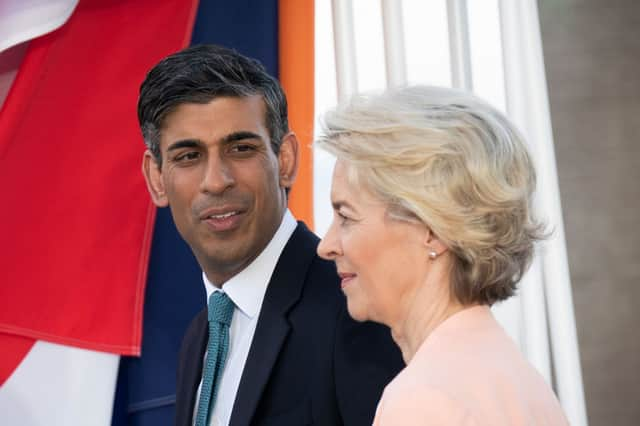UK rejoins £85bn EU Horizon science research programme after Brexit row
and live on Freeview channel 276
The UK is to return to the European Union’s £85 billion Horizon research programme, after being frozen out in a row over post-Brexit rules.
Scientists can apply for grants from today (7 September) to collaborate with fellow academics across the EU, after Prime Minister Rishi Sunak secured what he called “the right deal for British taxpayers”.
Advertisement
Hide AdAdvertisement
Hide AdSunak had been considering a UK-based alternative to Horizon called Pioneer, however with pressure from scientists he announced Britain was rejoining today in the latest post-Brexit climbdown. Labour analysis found that the UK missed out on almost £1 billion per year in funding from Horizon, after the Brexit fallout.
According to the EU’s estimate, the UK will contribute around £2.2 billion (almost 2.6 billion euros) per year to participate in both Horizon and the Copernicus space programme from 1 January when its association membership with the projects begins. It will not take part in the bloc’s nuclear technology scheme, Euratom.
British scientists had been frozen out of the scheme in a tit-for-tat retaliation over post-Brexit trading rules for Northern Ireland in 2020. However, negotiations to rejoin started after Rishi Sunak agreed the Windsor framework in February.


The government said the deal includes a “clawback” mechanism, which means the UK will be compensated if British scientists receive significantly less money than the UK puts into the programme, however previously this has not been the case.
Advertisement
Hide AdAdvertisement
Hide AdSunak said: “With a wealth of expertise and experience to bring to the global stage, we have delivered a deal that enables UK scientists to confidently take part in the world’s largest research collaboration programme – Horizon Europe. We have worked with our EU partners to make sure that this is right deal for the UK, unlocking unparalleled research opportunities, and also the right deal for British taxpayers.”
European Commission president Ursula von der Leyen, who signed off on the deal with the Prime Minister in a call on Wednesday, said: “The EU and UK are key strategic partners and allies, and today’s agreement proves that point. We will continue to be at the forefront of global science and research.”
While Keir Starmer announced last night that Labour was in favour of rejoining ahead of the announcement. He said: "The UK’s scientific talent and ambition shouldn’t have to wait a minute longer for funding and certainty so they can deliver on their ideas, for jobs and for our economy.


What is Horizon Europe?
Horizon Europe is a EU funding programme, which will allocate around £85 billion of grants to scientific projects between 2021 and 2027. It follows the Horizon 2020 programme, which ran from 2014 to 2020 and the UK was a part of. EU member states and Horizon associate members, which Britain has become, contribute the funds which get allocated to individuals or institutions on merit.
Advertisement
Hide AdAdvertisement
Hide AdThe aim is to tackle the continent and world's most pressing issues from disease to climate change and energy security. Britain historically received more back in grants than money it paid into the programme, and a report in 2016 found scientific and medical research was significantly propped up by EU funding.
The UK Research and Innovation fund has been providing grants which otherwise would have been given by Horizon, however scientists have argued that collaborating across Europe is what makes the programme so successful.
What have scientists said?
Sir Adrian Smith, president of the Royal Society, said it is “fantastic news”. “Science has so much to offer in terms of tackling global challenges and improving lives. Today the Government and the EU have given that a big boost,” he said.
Sir Paul Nurse, director of the Francis Crick Institute, said he is “thrilled to finally see that partnerships with EU scientists can continue”. “This is an essential step in rebuilding and strengthening our global scientific standing,” he added. “Thank you to the huge number of researchers in the UK and across Europe who, over many years, didn’t give up on stressing the importance of international collaboration for science.”
Advertisement
Hide AdAdvertisement
Hide AdMichelle Mitchell, chief executive of Cancer Research UK, said it will be “overwhelmingly in the best interests of cancer patients and scientists”.
Universities UK president Professor Dame Sally Mapstone said: “Allowing our scientists to work together, irrespective of borders, is in all of our interests. “Our universities will now do everything possible to ensure the UK rapidly bounces back towards previous levels of participation and is able to secure genuine value, delivering the wealth of research opportunities available.”
Comment Guidelines
National World encourages reader discussion on our stories. User feedback, insights and back-and-forth exchanges add a rich layer of context to reporting. Please review our Community Guidelines before commenting.
